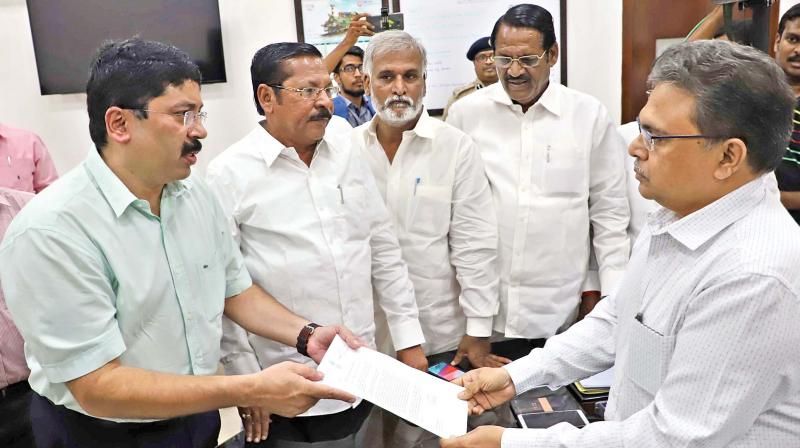Southern Railway withdraws controversial ‘English or Hindi’ order
Opposition parties strongly objected to the order.

CHENNAI: A controversial order issued to officials of the Southern Railway (SR) to communicate only either “in English or Hindi” was withdrawn on Friday following protests from Tamil Nadu opposition parties led by the DMK, charging it amounted to imposing Hindi on southern states.
In a circular dated June 12, the SR’s Chennai division had asked divisional control offices and station masters to communicate “either in English or Hindi”, and avoid the use of regional languages, to prevent “either side not understanding what is being said.”
The order was issued after a collision between two trains was miraculously averted recently near Tirumangalam in Madurai district, following a communicative confusion among officials speaking different languages.
Opposition parties strongly objected to the order.
The DMK and PMK called it another instance of Hindi being imposed on the state, where the recent Kasturirangan report on the new draft education policy recommending a uniform three-language formula for schools creating a storm across Tamil Nadu.
DMK president M.K. Stalin in a tweet called it, “Hindi hegemony and destruction of Tamil language” and warned SR that “We will stop you if you don’t stop this.”
“They are playing with sentiments of Tamil people and provoking us,” he added.
Things began to move fast midday, when DMK Central Chennai MP Dayanidhi Maran, along with organising secretary Alandhur Bharathi, demonstrated at the entrance of SR’s headquarters here and then later met its GM, Rahul Jain. They explained the serious implications of the move.
Mr. Maran, it is learnt, even when he was in the GM's room, connected him to Mr. Stalin over phone when the latter insisted with Mr. Jain that the already existing arrangement in SR should continue. The new order should be withdrawn, Stalin demanded.
Following this development, Southern Railways hastily scrapped the order, issuing a new one on Friday that said, "it may be ensured that communication between Control and Station Masters does not give room to any misunderstanding or ambiguity and is clearly understood by all concerned." The officials were told to communicate in the language they were familiar with and without any ambiguity.
Mr. Maran in his petition to the SR general manager said, Mr. Stalin had requested to "notify the concerned authority to use regional language of the southern division as well and not to limit the mediums of official communication to just two languages."
"I would also like to point out that English and Tamil is comfortable for Central authorities to relay instructions. Please note that a large number of employees are regional employees who know Tamil and English and not Hindi," Maran said in his letter.
A more forceful objection to the new order came from All India Railwaymen's Federation working president Dr N. Kanniah. In his memorandum, he said if the concerned individuals were comfortable enough in communicating in a particular language, there should not be any bar in using that particular language.
Mr Kanniah said, "this being the case, on account of a few stray cases of miscommunication, issuance of an official circular from the headquarters, banning the usage of local language /Tamil, in communication is highly improper and unwarranted, as it has fermented into a linguistic issue, enabling the political parties in the State to capitalize on the discontentment, which is growing among the majority of the Tamil-speaking employees (in the Railways)." No wonder, the SR promptly withdrew its earlier objectionable circular.

